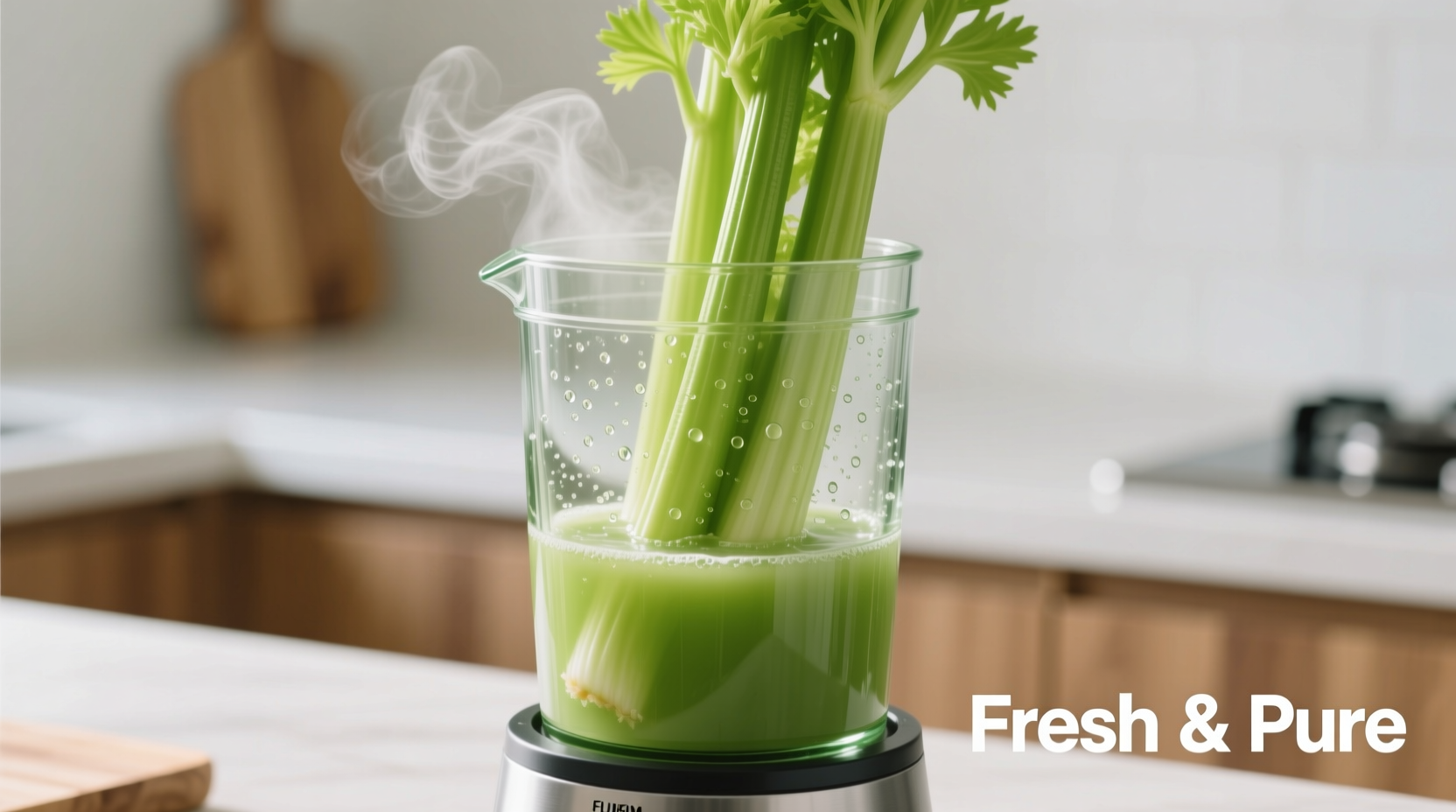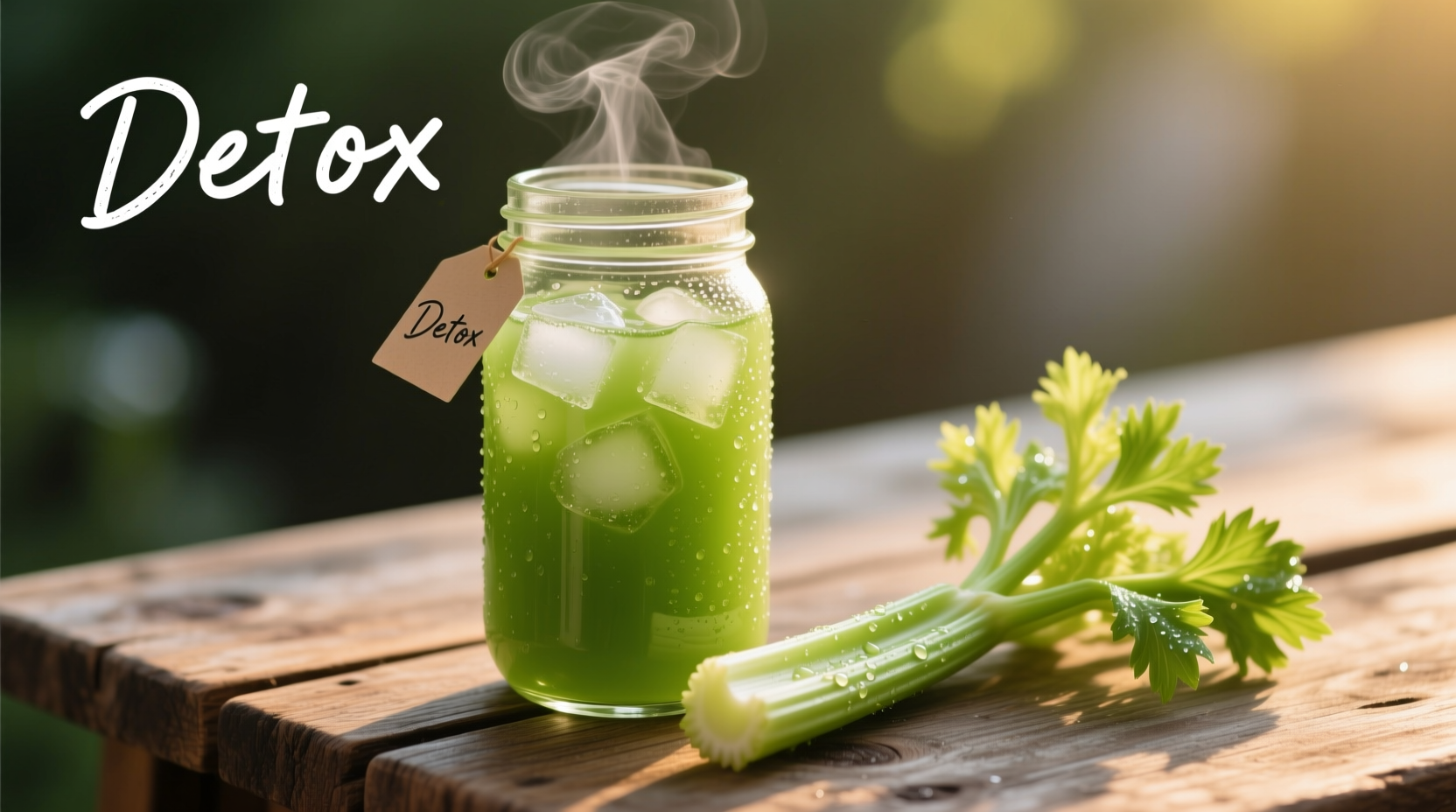Celery juice detox does not provide special detoxification benefits beyond what your body naturally does. Research shows no evidence that celery juice removes toxins more effectively than your liver and kidneys, though celery does contain beneficial nutrients like vitamin K, potassium, and antioxidants. This evidence-based analysis separates marketing claims from scientific reality.
When you search for "celery juice detox," you're likely wondering if this popular wellness trend actually delivers on its bold promises. As a food science researcher who's tracked hundreds of dietary trends, I've analyzed the claims against clinical evidence so you can make informed decisions about your health without falling for hype.
What Is Celery Juice Detox and Why Has It Gained Popularity?
The celery juice detox trend involves drinking 16-32 ounces of pure celery juice daily, typically on an empty stomach. Popularized by wellness influencers claiming it can "reset" your digestive system, reduce inflammation, and eliminate toxins, this practice has gained millions of followers despite limited scientific backing.
Unlike medically supervised detox programs for substance abuse, dietary "detoxes" like celery juice lack standardized protocols or clinical validation. Your liver and kidneys naturally filter toxins 24/7—no special juice required. This distinction is crucial when evaluating detox claims that often blur the line between metaphorical cleansing and actual physiological processes.

Celery Juice Claims vs. Scientific Evidence: Fact Comparison
| Common Claims | Scientific Reality | Research Source |
|---|---|---|
| "Removes heavy metals and toxins" | No evidence celery specifically targets toxins; liver/kidneys handle detox naturally | National Institutes of Health (2023) |
| "Heals digestive issues like IBS" | Limited evidence; may help some due to hydration but worsen symptoms in others | Mayo Clinic Proceedings (2022) |
| "Reduces inflammation significantly" | Celery contains antioxidants but effects are modest compared to whole dietary patterns | Journal of Agricultural and Food Chemistry (2021) |
| "Requires 16+ ounces for benefits" | No research supports specific therapeutic dosage; regular vegetable intake suffices | Academy of Nutrition and Dietetics (2024) |
Actual Benefits of Celery: Separating Fact from Fiction
Celery itself offers legitimate nutritional benefits, though not the miracle properties often claimed:
- Hydration boost: With 95% water content, it contributes to daily fluid needs
- Antioxidant compounds: Contains luteolin and apigenin with modest anti-inflammatory effects
- Potassium source: Supports healthy blood pressure regulation
- Fiber content: Whole celery provides more digestive benefits than juice alone
The issue arises when these modest benefits get amplified into extraordinary health claims. As Harvard T.H. Chan School of Public Health notes, no single beverage can replace balanced nutrition. Consuming celery as part of a varied diet delivers benefits without the risks of restrictive juice protocols.
Who Should Avoid Celery Juice Detox and Why
Certain populations face specific risks with concentrated celery juice consumption:
Context Boundaries: When Celery Juice Becomes Risky
- People with kidney disease: High potassium content may cause dangerous electrolyte imbalances
- Those on blood thinners: Vitamin K content can interfere with medication efficacy
- Individuals with celery allergies: Can trigger oral allergy syndrome or severe reactions
- People with digestive disorders: High sodium content may worsen hypertension
The Academy of Nutrition and Dietetics warns that replacing meals with celery juice can lead to nutrient deficiencies, particularly in protein, healthy fats, and certain vitamins. For most people, eating whole celery provides more fiber and balanced nutrition than juice alone.
How to Incorporate Celery Safely: Evidence-Based Recommendations
If you enjoy celery juice, here's how to include it responsibly without falling for detox mythology:
- Consume as part of balanced meals: Pair with protein and healthy fats to slow sugar absorption
- Choose whole celery when possible: Provides 3x more fiber than juice for better digestion
- Limit to 8 ounces daily: Avoid excessive sodium intake (one cup contains 88mg sodium)
- Consult your doctor first: Essential if you have kidney issues or take medications
- Don't replace medical treatment: Never use as substitute for prescribed therapies
Registered dietitians recommend focusing on overall dietary patterns rather than single "miracle" foods. As the Academy of Nutrition and Dietetics states, "Your body has built-in detox systems—support them with balanced nutrition, not restrictive juice cleanses."
Expert Consensus on Dietary Detox Trends
Medical professionals consistently emphasize that sustainable health comes from consistent habits, not short-term fixes. The "detox" industry generates billions annually despite lacking scientific foundation. When evaluating similar trends, consider these red flags:
- Claims of "quick fixes" for complex health issues
- Requirement to purchase special equipment or products
- Testimonials replacing clinical evidence
- Warnings that conventional medicine "doesn't understand" the approach
Instead, focus on evidence-backed practices: adequate sleep, stress management, regular physical activity, and diverse whole-food nutrition. These approaches deliver measurable health benefits without the risks of unproven detox protocols.











 浙公网安备
33010002000092号
浙公网安备
33010002000092号 浙B2-20120091-4
浙B2-20120091-4